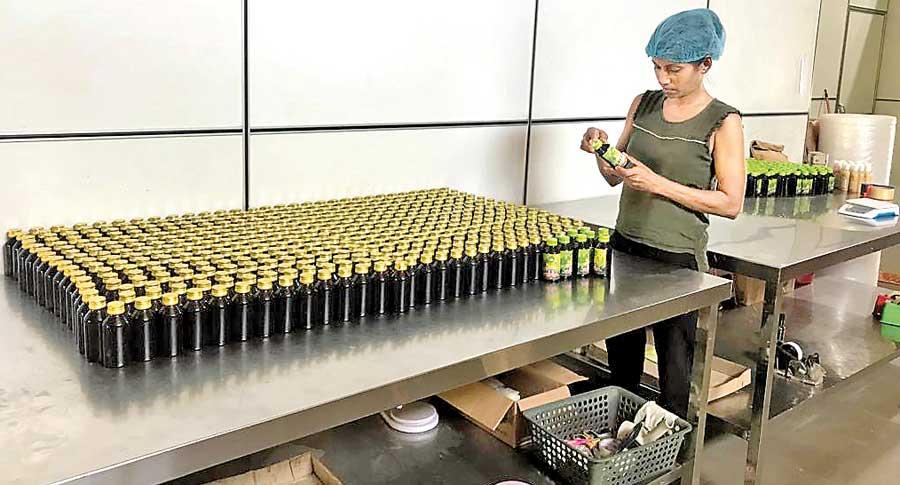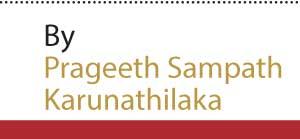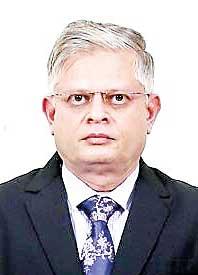Reply To:
Name - Reply Comment

Traditional medicine practitioners pointed out that they would be unable to effectively grow or keep local medicines with them once the proposed amendments to the Ayurveda Act are passed in parliament
(pic by Samnatha Perera)
Traditional medicine practitioners have alleged that the government is attempting to hastily amend the Ayurveda Act No. 31 of 1961 with the expectation of gaining 28 million US Dollars. Traditional medicine practitioners Dr. Kamal Bandula Weerapperuma and Dr. Washington Galhenage Nanayakkara have filed a case before the Supreme Court seeking legal assistance against the proposed amendments which they claim are not in accordance with the Ayurveda Act. Consequently, the Supreme Court submitted the decision of the case to the Parliament on August 10. This amended bill will be subject to debate in parliament and a subsequent vote taking before it’s eventually passed.
Traditional medicine practitioners Dr. Kamal Bandula Weerapperuma and Dr. Washington Galhenage Nanayakkara have filed a case before the Supreme Court seeking legal assistance against the proposed amendments which they claim are not in accordance with the Ayurveda Act. Consequently, the Supreme Court submitted the decision of the case to the Parliament on August 10. This amended bill will be subject to debate in parliament and a subsequent vote taking before it’s eventually passed.
Traditional medicine practitioners underscored that the government is prepared to amend the Ayurveda Act in order to facilitate the expansion of hemp cultivation. Accordingly, hemp cultivation is to be expanded through the involvement of private investors. An Indian investor has already expressed interest in this venture. The proposed amendments to the Ayurveda Act don’t make any mention of hemp cultivation. However, certain clauses within the act suggest a provision being made for foreign companies to cultivate all medicinal herbs used in local remedial medicines. This situation results in a scenario where practitioners are unable to cultivate essential local medicinal herbs and the only option available to them will be to obtain these medicines from foreign companies engaged in this type of cultivation.
“In traditional and Ayurvedic medicine, ‘Chikitsa’ refers to the use of mantras while applying medicinal treatments and rituals such as ‘Seth Santhi’ or ‘Thovil’ for individuals who are unwell. ‘Chikitsa’ plays a substantial role in traditional medicine practices,” - Dr. Kamal Bandula Weerapperuma Traditional Medicine Practitioner
As per the amendments proposed for the new Ayurveda Act, all medicinal plants utilised for medicinal purposes are covered in it. The recent amendments mention the term ‘herbal gardens.’ Furthermore, the Act states that each herb garden will be subject to regulation, overseen by the Department of Ayurveda with the Commissioner General as the head. Under these regulations, local medicines are allocated only to doctors for research purposes. Traditional medicine practitioner Dr. Weerapperuma pointed out that they would be unable to effectively grow or keep local medicines with them.
The term ‘Chikitsa’- used to explain indigenous medicine in the previous Ayurveda Act- has been omitted in the new amendments. “The engagement of an Ayurvedic practitioner in ‘Chikitsa’ might even be interpreted legally as an offense. In traditional and Ayurvedic medicine, ‘Chikitsa’ refers to the use of mantras while applying medicinal treatments and rituals such as ‘Seth Santhi’ or ‘Thovil’ for individuals who are unwell. ‘Chikitsa’ plays a substantial role in traditional medicine practices,” said Dr. Weerapperuma. He added that the exclusion of ‘Chikitsa,’- a fundamental component for practitioners of traditional medicine- from the new amendments could be of serious concern.
The engagement of an Ayurvedic practitioner in ‘Chikitsa’ might even be interpreted legally as an offense
 Additionally, the new amendments had introduced the role of Ayurvedic dispenser professionals, named as pharmacists. These professionals are responsible for dispensing and compounding medicines based on Ayurvedic principles. The new act will grant them (pharmacists) the authority to manage dispensaries and prepare medicines; which can overlap with the responsibilities of Ayurvedic doctors. “However, in response to a directive from the Supreme Court, the term ‘pharmacist’ has been removed from the new amendment. This amendment poses significant repercussions for both Ayurvedic doctors and graduates in Ayurveda. Consequently, legal measures have been taken against this,” underscored by Dr. Nanayakkara.
Additionally, the new amendments had introduced the role of Ayurvedic dispenser professionals, named as pharmacists. These professionals are responsible for dispensing and compounding medicines based on Ayurvedic principles. The new act will grant them (pharmacists) the authority to manage dispensaries and prepare medicines; which can overlap with the responsibilities of Ayurvedic doctors. “However, in response to a directive from the Supreme Court, the term ‘pharmacist’ has been removed from the new amendment. This amendment poses significant repercussions for both Ayurvedic doctors and graduates in Ayurveda. Consequently, legal measures have been taken against this,” underscored by Dr. Nanayakkara.
The act addresses the registration of traditional medical practitioners and this should be carried out by a formal board. However, a significant concern arises regarding the potential blending of traditional indigenous medicine with Ayurvedic medicine; the latter which originates from India and is distinct from indigenous practices. There is a pressing need to thoroughly examine this matter, according to Dr. Nanayakkara.
In the proposed amendment the term ‘massage officer’ has been introduced. This particular phrase is not found within the context of indigenous medicine. This leads to a concern whether there is an attempt to legalise activities associated with prostitution. When a massage is conducted following Ayurvedic practices, it should strictly adhere to the principles of Ayurveda. Traditional medicine practitioner Nanayakkara pointed out that if not a significant issue could arise.
“ This bill holds exceptional significance. The entire country has been eagerly awaiting the Supreme Court’s verdict on its legality and constitutionality. It is of utmost importance that the Supreme Court’s decision is communicated in the Sinhala language, enabling the majority of the country’s population to understand it more effectively’’ - Laksiri Unawatuna Attorney-at-law Aruna
“The requirement for a trained caregiver to be designated as a medical assistant is also stipulated. However, this poses a challenge to the traditions of traditional medicine. In traditional practices, those responsibilities are often handled by the offspring and kin of Ayurvedic practitioners. When this matter was raised with the minister his response was that this clause refers to hospitals. If that is the case, it should have been stated in writing. But it is not yet stated. Should these regulations be enforced Ayurvedic practitioners will be compelled to pay them salaries. Traditional Ayurvedic practitioners do not receive allowances or government benefits. There are also those who do not charge their patients for services rendered,” said Dr. Nanayakkara. He added that the ability of Ayurvedic practitioners to deliver their services effectively may be compromised if they are required to hire trained individuals and pay them salaries.
Under this amendment bill the plan is aimed at suppressing indigenous medicine through Ayurveda. “The new Act introduces a revised system of practice within traditional medicine, fully blended with Indian Ayurveda. The new act strives to take steps towards promoting this system across the country. Indigenous medicine is present in our country. Now, efforts are being made to blend or suppress Indigenous medicine using Indian Ayurveda,” said Dr. Nanayakkara. He said that the Ayurveda Act of 1961 had laid the foundational framework for that, and the recent changes seem to make this even more possible.
An Indian investor has already expressed interest in the venture to expand hemp cultivation
Attorney-at-law Aruna Laksiri Unawatuna, the lawyer primarily responsible for submitting this bill to the Supreme Court, made the following statement: “This bill holds exceptional significance. The entire country has been eagerly awaiting the Supreme Court’s verdict on its legality and constitutionality. It is of utmost importance that the Supreme Court’s decision is communicated in the Sinhala language, enabling the majority of the country’s population to understand it more effectively. Safeguarding the sovereignty of the people’s language falls within the Speaker’s purview. Therefore it is crucial to include the Supreme Court’s conclusion in the Hansard report not only in English, but also in Sinhala and Tamil languages. The Speaker’s positive response to this request is appreciated. The Supreme Court’s decision, conveyed to the Speaker on August 10, is as follows: ‘The term ‘pharmacist,’ which the government had agreed to remove from the 2023 Ayurveda amendment, must be stricken. If the government insists on retaining this term, a referendum becomes necessary. However, the government has also agreed to remove it during our discussions’. Lawyer Unawatuna said that therefore a referendum is unnecessary.
The Supreme Court has issued its stance on six additional amendments. If these six amendments are deemed necessary, they must secure a 2/3 approval in Parliament. Nonetheless, the Supreme Court has declared that, subject to seven amendments, the bill can be ratified through a majority vote in Parliament. Unawatuna further noted that the new bill could be passed with the votes of 20 parliamentary members.
Traditional medicine practitioners underscored that the state wants to amend the Ayurveda Act to facilitate the expansion of hemp cultivation
This newspaper’s attempts to contact State Minister of Indigenous Medicine Sisira Jayakody proved futile. The Minister however had stated the following while attending a media conference held at the President’s Media Division. “We have submitted the necessary work to amend the Ayurveda Act established in 1961 to the Parliament. The Supreme Court has also provided guidelines on this matter. Our intention is to make essential amendments to the Ayurveda Act in accordance with the orders of the Supreme Court. The Supreme Court has approved the amendments related to cultivating medicinal plants, needed to boost the country’s export sector and generate foreign exchange. Additionally, we have proposed several changes as amendments to the organizational structure of Ayurveda to enhance its efficiency. We hope to receive Parliamentary approval for them in the future,” Jayakody had told media representatives.
The State Minister had also added that the Ministry of Indigenous Medicine and the Department of Ayurveda have initiated a programme aimed at elevating the local medicine sector to an industry capable of generating foreign exchange through commercial value.
 “This new amendment was introduced to preserve the democratic essence of the original act”
“This new amendment was introduced to preserve the democratic essence of the original act”
- Dr. Abeygunawardena
Ayurveda Commissioner Dr. M.D.J. Abeygunawardena said the following. “Multiple parties approached the Supreme Court regarding the newly amended Act. Following this, the Supreme Court highlighted the clauses requiring modification. Parliament should take decisions regarding these alterations. Following the second reading, amendments will be made in accordance with the Supreme Court’s decisions and the Act will be ratified by Parliament. The term ‘pharmacist’ and another term in the previous Act have been omitted due to technical reasons. This issue requires rectification.
Indigenous medical practitioners are of the opinion that they are prohibited from cultivating local medicine and that these medicines can only be obtained from companies involved in their cultivation. This opinion is inaccurate. The Act doesn’t outline the responsibilities of indigenous medical practitioners. The existing act safeguards the rights of indigenous medical practitioners. The recent amendment focuses only on six aspects and the rest remains unchanged. We cannot change the act. This new amendment was introduced to preserve the democratic essence of the original act,” he added.
“The act is undergoing amendments to establish four universities and to restructure the Ayurveda Act. As per the existing Ayurveda act, the Commissioner holds absolute authority, and this is not feasible now. To address this, the act was modified to include the appointment of six or seven additional commissioners. This move raised concerns among indigenous medical practitioners, leading them to resort to legal action. No harmful consequences have emerged from this. Once the matter is taken for debate in Parliament, the act will be amended with the most favorable provisions,” he added.